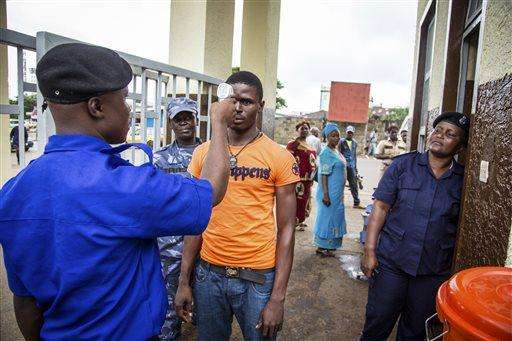Ebola Comes to Last Safe District in Sierra Leone
 The deadly Ebola virus has infected two people in what was the last untouched district in Sierra Leone, the government said Thursday, a setback in efforts to stop the spread of the disease in one of the hardest-hit countries.
The deadly Ebola virus has infected two people in what was the last untouched district in Sierra Leone, the government said Thursday, a setback in efforts to stop the spread of the disease in one of the hardest-hit countries.
The Emergency Operations Center in its report covering Wednesday noted the two Ebola cases in the Koinadugu district, in Sierra Leone's far north, which had taken aggressive measures to keep the virus out of its mountainous territory since the outbreak early this year.
"It was the only place we are counting on where you can go and breathe a sigh of relief and to know that now in the whole country no district is safe, is heartrending," said John Caulker, the executive director of the nonprofit Fambul Tok, a group that worked on keeping Ebola out of the district.
"Now we will increase our activities in the district and take the necessary measures to make sure the area is safe and it does not spread," he added, noting it was just in a single chiefdom so far.
Ebola is rampant in the rest of the country, with 425 new cases just in the last week and a health care system that is struggling to deal with the onslaught of the disease. The World Health Organization said there have been more than 3,000 infections in Sierra Leone with nearly 1,200 deaths.
Last week, the district's health team received word of people dying in the village of Fakonya, some 60 miles over very rough terrain from the town of district center of Kabala, said Abdul Sesay, a local health official.
Some 15 people had died in the village and then two of the six samples tested came back as positive — the deaths had originally been attributed to witchcraft, according to Sesay.
The town has now been isolated and nearby communities have been put under observation.
Momoh Konte, a businessman born in the district and educated in the United States who has been very active in protecting Koinadugu, told local press Thursday that the dead and their homes would be cremated to protect the living.
Under the system put in place by Konte and Caulker, movement in and out of the district was through a pass system and protective equipment and chlorine were brought in to stem the transmission of the disease.
The deadly Ebola virus is transmitted by bodily fluids and has hit hardest in Sierra Leone, Liberia and Guinea.
International agencies and countries are trying to boost the capacity of the countries to fight the disease where overstretched health care systems and minimal sanitation have allowed transmission to rage almost unchecked.
The director of the U.S. Agency for International Development, Rajiv Shah, visited Sierra Leone Wednesday as part of a tour through the three hardest-hit countries where he announced an additional $142 million in projects and grants to battle the outbreak.
There has been investment in new treatment centers and equipment for health care workers but so far, the disease continues to spread in Sierra Leone where the WHO has described rate of transmission in the capital Freetown as "intense." Liberia has also been particularly hard hit.
More than 4,400 people have died from the disease so far, according to WHO.
_____
Schemm reported from Rabat.